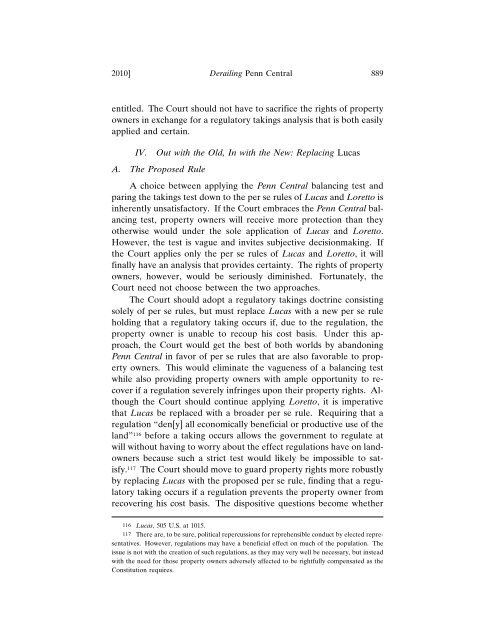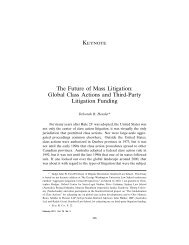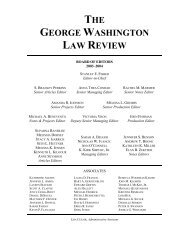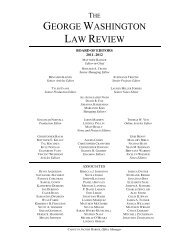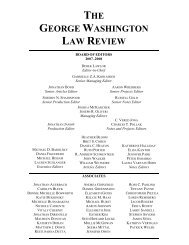View PDF - The George Washington Law Review
View PDF - The George Washington Law Review
View PDF - The George Washington Law Review
You also want an ePaper? Increase the reach of your titles
YUMPU automatically turns print PDFs into web optimized ePapers that Google loves.
2010] Derailing Penn Central 889<br />
entitled. <strong>The</strong> Court should not have to sacrifice the rights of property<br />
owners in exchange for a regulatory takings analysis that is both easily<br />
applied and certain.<br />
IV.<br />
Out with the Old, In with the New: Replacing Lucas<br />
A. <strong>The</strong> Proposed Rule<br />
A choice between applying the Penn Central balancing test and<br />
paring the takings test down to the per se rules of Lucas and Loretto is<br />
inherently unsatisfactory. If the Court embraces the Penn Central balancing<br />
test, property owners will receive more protection than they<br />
otherwise would under the sole application of Lucas and Loretto.<br />
However, the test is vague and invites subjective decisionmaking. If<br />
the Court applies only the per se rules of Lucas and Loretto, it will<br />
finally have an analysis that provides certainty. <strong>The</strong> rights of property<br />
owners, however, would be seriously diminished. Fortunately, the<br />
Court need not choose between the two approaches.<br />
<strong>The</strong> Court should adopt a regulatory takings doctrine consisting<br />
solely of per se rules, but must replace Lucas with a new per se rule<br />
holding that a regulatory taking occurs if, due to the regulation, the<br />
property owner is unable to recoup his cost basis. Under this approach,<br />
the Court would get the best of both worlds by abandoning<br />
Penn Central in favor of per se rules that are also favorable to property<br />
owners. This would eliminate the vagueness of a balancing test<br />
while also providing property owners with ample opportunity to recover<br />
if a regulation severely infringes upon their property rights. Although<br />
the Court should continue applying Loretto, it is imperative<br />
that Lucas be replaced with a broader per se rule. Requiring that a<br />
regulation “den[y] all economically beneficial or productive use of the<br />
land” 116 before a taking occurs allows the government to regulate at<br />
will without having to worry about the effect regulations have on landowners<br />
because such a strict test would likely be impossible to satisfy.<br />
117 <strong>The</strong> Court should move to guard property rights more robustly<br />
by replacing Lucas with the proposed per se rule, finding that a regulatory<br />
taking occurs if a regulation prevents the property owner from<br />
recovering his cost basis. <strong>The</strong> dispositive questions become whether<br />
116 Lucas, 505 U.S. at 1015.<br />
117 <strong>The</strong>re are, to be sure, political repercussions for reprehensible conduct by elected representatives.<br />
However, regulations may have a beneficial effect on much of the population. <strong>The</strong><br />
issue is not with the creation of such regulations, as they may very well be necessary, but instead<br />
with the need for those property owners adversely affected to be rightfully compensated as the<br />
Constitution requires.


